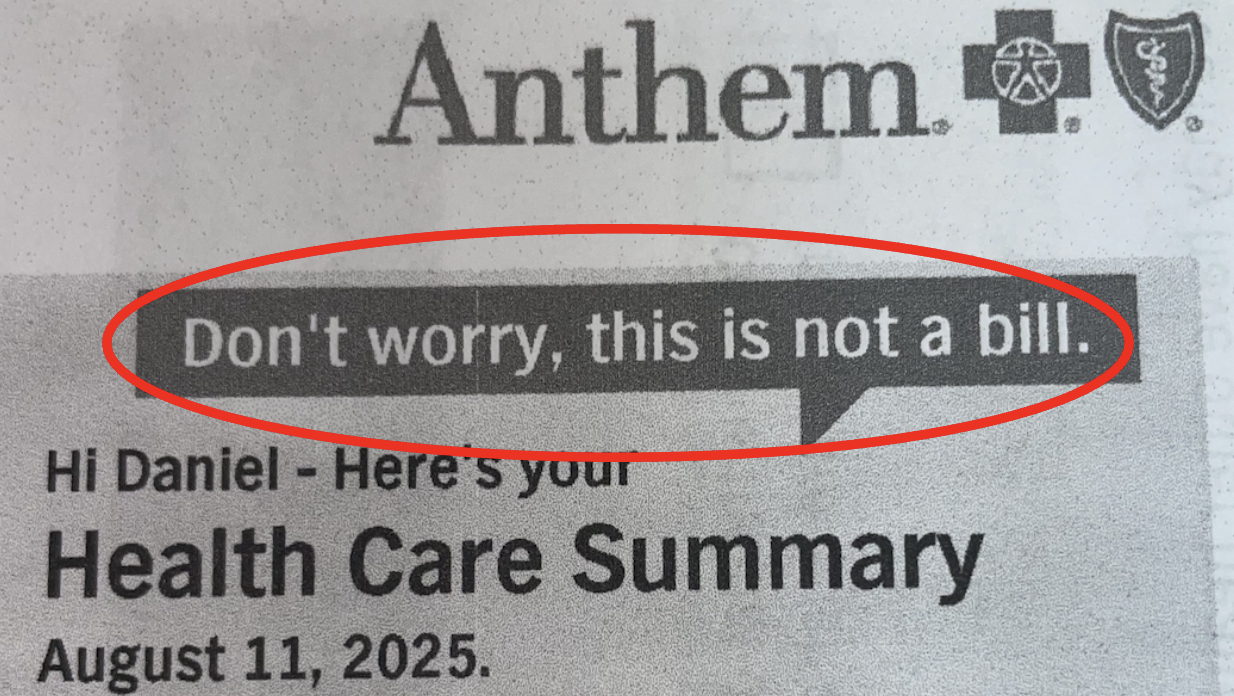Don’t Tell People How to Feel
An Anthem health insurance summary implores me not to worry
Respect > Reassurance
Leaders have a responsibility to speak from the heart and, at times, to stir emotion in their teams. When talking about the future of an organization—its purpose, its direction, its impact—painting a hopeful and inspiring picture is essential. And in moments of crisis, candor about the challenges ahead and the emotions people might encounter can help steady the team and ease anxiety.
But when the conversation shifts to certain topics, the rules change. When it comes to compensation, benefits, or anything that touches an employee’s livelihood or status, leaders must resist the urge to script emotions. In these moments, respect matters more than reassurance. Inspiration must give way to caution, humility, and clarity. Because when basic needs like pay, healthcare, or job security are changing (if even "for the better") employees deserve the dignity of processing the news in their own way.
Don't Worry?
I was reminded of this recently when I received a statement from my health insurance company. In the top right corner, inside a cheerful speech bubble, it read: “Don’t Worry – It’s Not a Bill.”
"Cute", I thought to myself. Maybe it was meant to reassure. But I had just undergone joint replacement surgery with an out-of-network surgeon and hospital. My HMO had granted me an exemption, but until the bills arrived, the true cost remained a mystery. And sure enough, just below the “Don’t Worry” bubble came the claims summary: “What You Owe — $13,000.”
Except this wasn’t even the complete summary. It didn’t cover all the services from the surgery. More bills are almost certainly on the way. Against that backdrop, “Don’t worry” didn’t feel reassuring—it felt downright insulting.
What had been intended as comfort instead came across as condescending. It reminded me of a simple truth when it comes to money or benefits: don’t tell people how to feel.
Just below the "Don't worry-it's not a bill" is a $13,000 I.O.U.
Lesson in Communication
Leaders may spend months wrestling with trade-offs, soliciting input and feedback and believing they’ve landed on a fair, balanced solution. By the time the plan is ready to unveil, they may feel proud, hopeful, even excited.
But assuming employees will share that enthusiasm is a mistake. For some, the change will land fine. For others, it will feel like a loss. And if someone is somehow negatively affected by the change, nothing feels more patronizing than being told not to worry—or being assured they should feel good about it.
These are moments where employees’ most basic needs are in play. Money isn’t abstract; it’s mortgage payments, childcare, groceries, retirement. Benefits aren’t just perks; they’re healthcare, security, and peace of mind. These are tangible and concrete and people make all kinds of meanings out of these things. When leaders communicate about these issues, there must be room for a range of reactions—disappointment, relief, frustration, gratitude, or anger. To deny that reality is to deny people their dignity.
Messaging Discernment
So yes, attempt to inspire hope and encourage enthusiasm when speaking about the company's future. And equally so, when things fall apart, be courageously open about the hardship that might ensue. But when the topic turns to compensation or benefits, communicate with clarity and confidence—without presumption. Present the facts plainly. Explain the reasoning transparently. Then allow employees the space to process, respond, and feel however they feel.
Lead with Respect
Allowing space for process and response, that’s what respect looks like. And it builds trust, even when the news seems welcome.
As for me, I’ll extend the same advice to my health insurance company: stop telling me not to worry. Just show me the numbers. And if you really want to inspire confidence, go ahead and knock a little off the $13,000 I apparently shouldn’t be worrying about.



